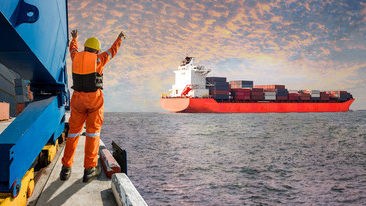At the height of the pandemic, an estimated 400,000 seafarers were stranded on ships around the globe, trapped by travel restrictions designed to reduce the spread of the coronavirus. That is a quarter of the 1.6 million seafarers who keep the world’s supply chains flowing in normal times.
While Covid continued to rampage around the world, seafarers had to remain separated from their homes, friends, and families, sometimes with very little support. The problems caused by the pandemic remain serious, with an estimated 200,000 seafarers still experiencing disruption to the pattern of crew change with obvious knock-on effects to their physical and mental wellbeing. The difficulties for seafarers have continued with the outbreak of the new Delta variant in India, prompting prominent organisations and welfare charities to launch an emergency relief fund in May this year, aiming to raise US$1 million.
The plight of crews after 16 months of the pandemic has also prompted organisations such as the UK Maritime & Coastguard Agency and International Chamber of Shipping to remind the entire shipping industry of its responsibilities. The severe problems seafarers have endured include abandonment and cancelled repatriation. It is unlikely to be a coincidence that 2020 saw an increased number of seafarer abandonment cases, which spiked at 75 cases worldwide.
For crews on many ships, Covid has led to severe social isolation, heavier workloads and fatigue, along with increased tension with shipmates through prolonged contact without any chance of going ashore. There is a debilitating sense of uncertainty about when conditions improve. The UK Maritime & Coastguard Agency in its Marine Information Note (MIN) about the impacts of Covid points out how this mixture of factors undermines productivity at sea and can potentially lead to the neglect of safety standards.
Historically, the welfare of seafarers has been problematic because of the widespread lack of transparency within the shipping industry, but it would be wrong to tar the entire industry with the same brush as some of the less conscientious owners and operators under whom seafarers are facing these conditions.
A company such as Pole Star has always had a deep understanding of the role of crews in maintaining critical maritime supply chains across our oceans, including of course medical supplies and hospital equipment. After 23 years of providing vessel-tracking and monitoring technologies to the maritime industry, we recognise the debt owed to our seafaring colleagues for enabling business continuity at all times, but particularly over the last extraordinarily difficult 16 months of this the Covid pandemic.
This is why the IMO’s Day of the Seafarer on 25th June is such an important concept, particularly this year. There has never been a more poignant and relevant time to promote the welfare of crews and seafarers. The shipping industry should be thinking about how it can prevent conditions that seafarers have experienced under the pandemic from recurring. Initiatives spearheaded by the IMO such as having seafarers designated as key workers, giving them greater priority for immunisation, healthcare and access to transport and other facilities are vital. It is also very encouraging to see the IMO and the International Chamber of Shipping lobby for more support, and to witness how charities such The Mission to Seafarers, Sailors’ Society, ISWAN and others continue to highlight the threats to seafarers’ welfare.
Fatigue and extended periods at sea have been long-standing problems that not only create a negative work experience for seafarers, but they also increase the risk of maritime accidents and environmental disasters that, in turn, threaten the security and reliability of our global supply chains. This renders the whole issue of crew working conditions one with repercussions beyond the maritime sector, which deserves to be more widely aired and addressed.
All stakeholders in the wider maritime industry have a responsibility to draw attention to the struggles of our seafaring colleagues. Yet despite some legislation and the introduction of regulations brought about by the ILO through the Maritime Labour Convention there are still significant welfare problems. The IMO seafarers poll found working conditions are the main area that respondents want addressed to provide them with “a fair future”. In terms of Covid impacts, the survey found they most want guaranteed access to repatriation and crew change.
Unfortunately, conditions aboard vessels can be notoriously difficult to monitor, and many issues do not surface. Like with many issues faced within the maritime industry, further transparency and accountability are needed for solutions to be reached.
Over the past five years, we have seen more and more coverage on the poor mental health faced by seafarers. Now, the pandemic has shone a searchlight into a murky area that the maritime industry needs to clear up. It can never be perfect, but it certainly needs to do better.

Julian Longson is Managing Director of Pole Star Space Applications Limited (UK) – a privately owned UK technology company developing pioneering technologies to empower maritime insight and inform real-world decisions. Julian has been central to Pole Star’s growth since it was formed in 1998, originally joining the start-up team as Business Development Manager, before progressing to the Pole Star Board as Business Development Director, Chief Business Development Officer, and Chief Strategy Officer.







